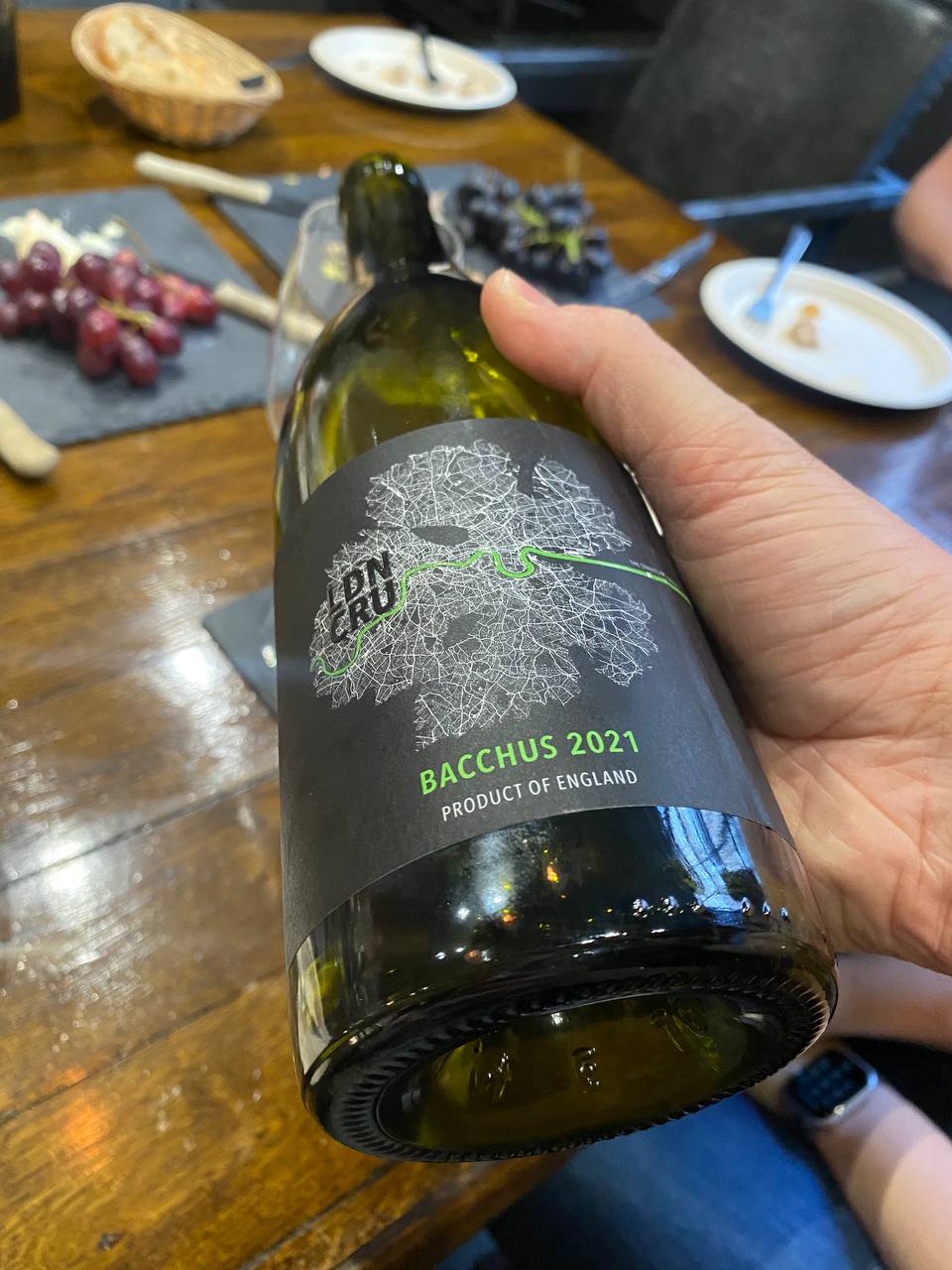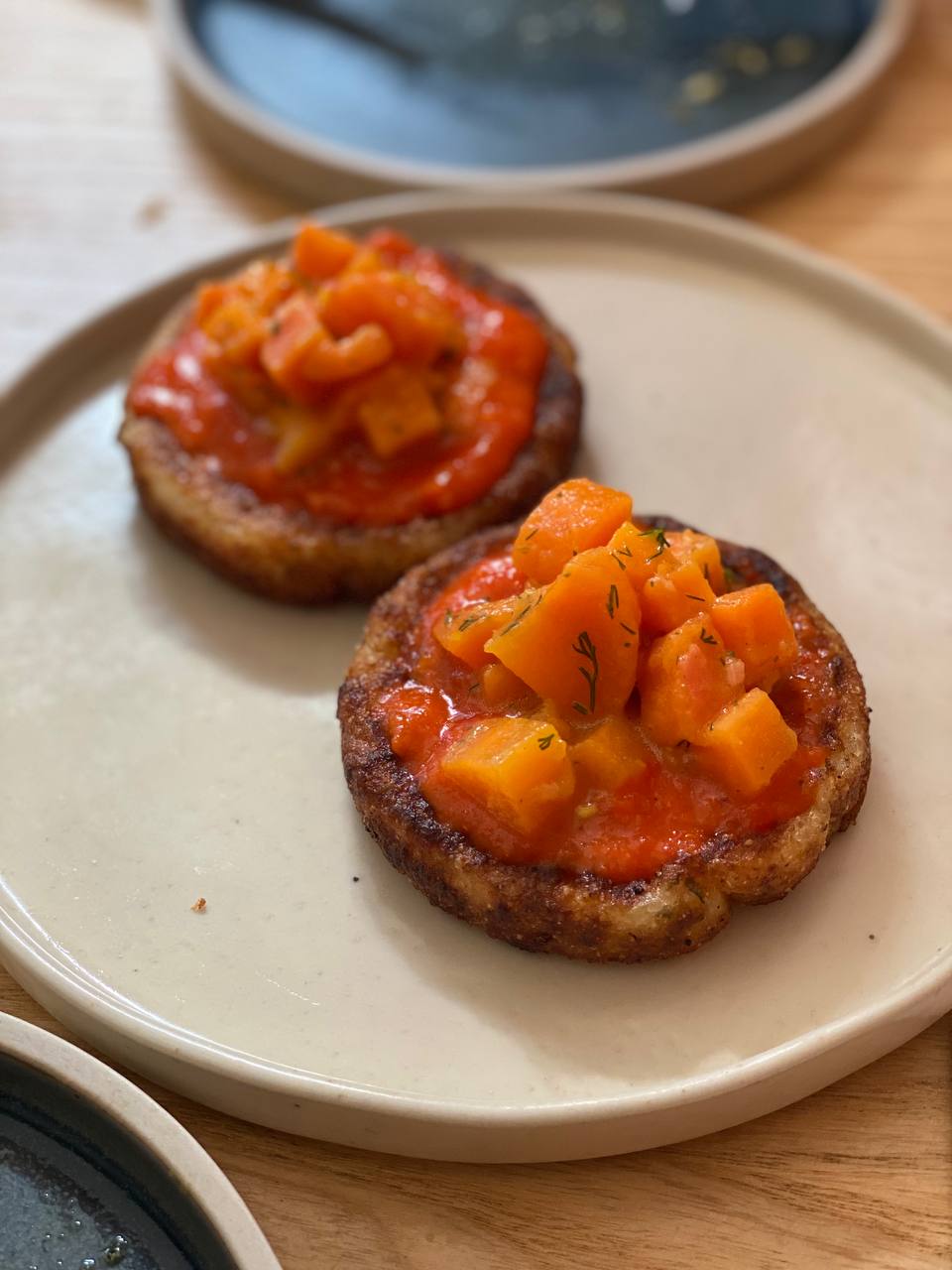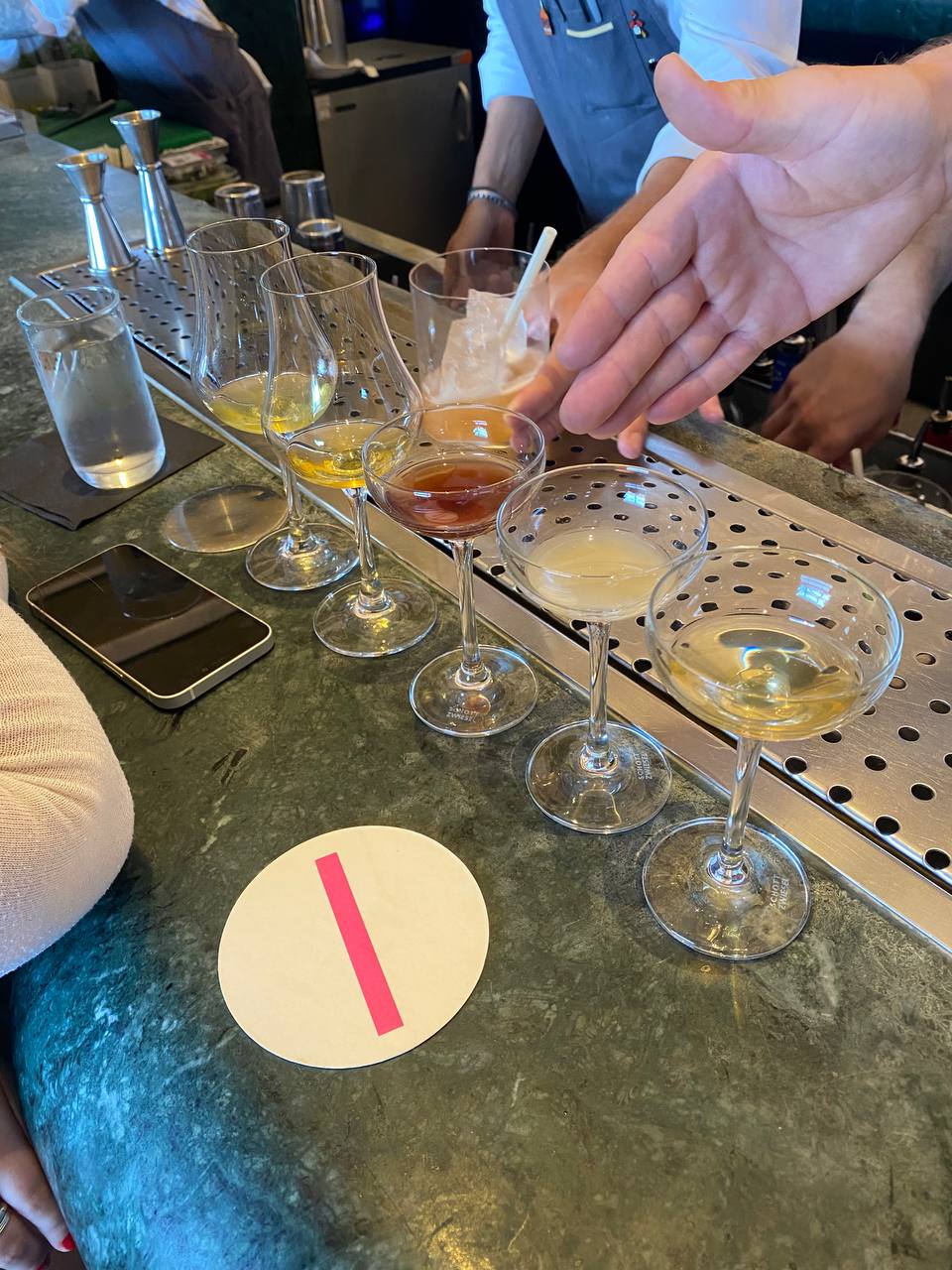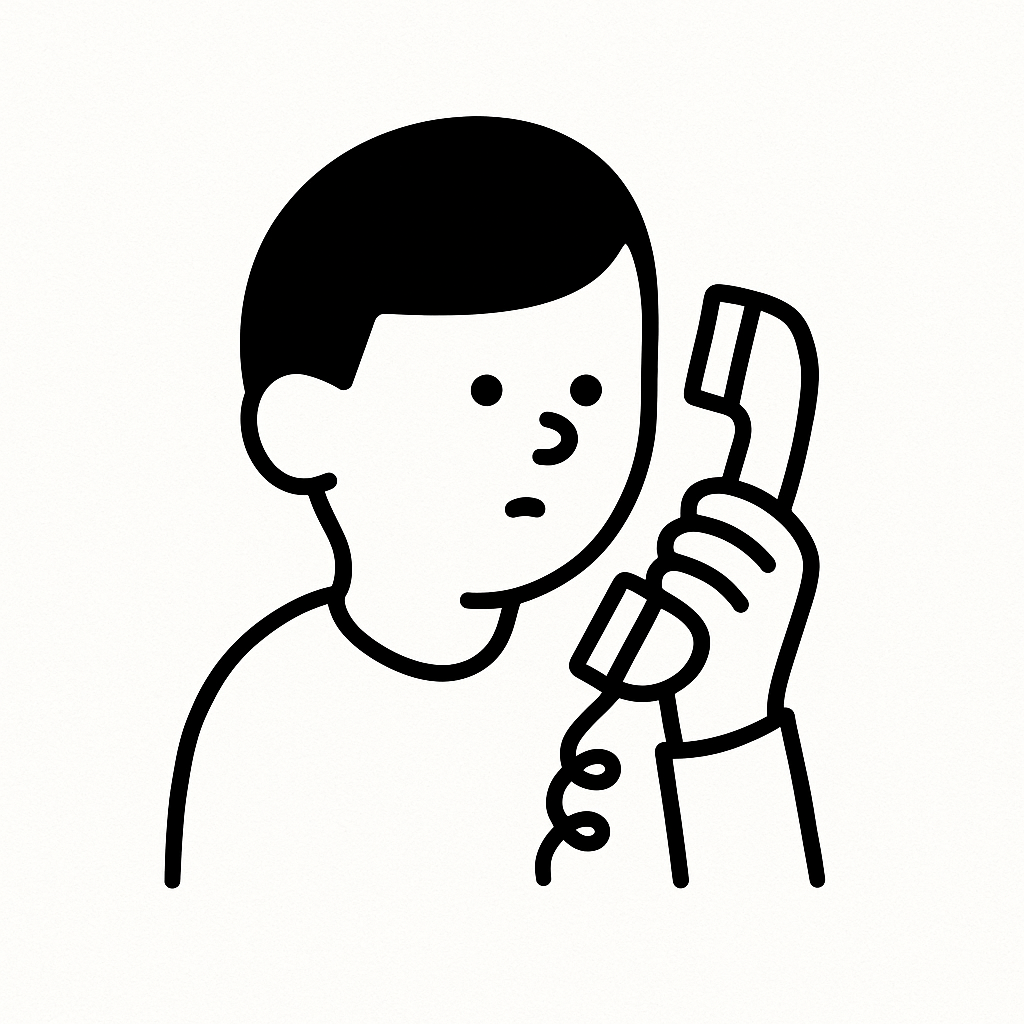#108
On 2021 vintage
For nearly a year I was a part of a tiny group of people making wine in an urban winery in the middle of London: from pressing to bottling.
It wasn't a quick process, and yet the time has come: on Friday the vintage was officially launched and pretty much hit shelves in shops:

I am mostly proud of Bacchus 2021. This was the first British grape I tried, and fell in love with pretty much instantly, and seeing how different it could be is still mind blowing. We've got to try the 2014 vintage of the same grape, and it's competely different -- mint and basil on the nose -- so quite excited to see what this one will be like in a few years.

Sasha also took me out for a dinner at the only London-based Michelin pub, which was quite an experience. This dessert that looks like creme brulee but is in fact burnt milk was very memorable:

We've also visited Chishuru for a quick lunch: these folks run a small place in the middle of the Brixton market, but managed to score the Best restaurant title from Time Out, and now I totally understand why. These pancakes with carrots and mango still tempt me for the second visit.

And even though the place is not fancy in the classic "Michelin" sense, the dishes are plated with lots of attention to details. Just look at this sorbet:

The only way to wrap up the week full of starred experience was to pay a visit to Lyaness bar, named the World's best bar last week. An impeccable hospitality from the team behind the bar, and some awesome ingredients in use. Here they are, from left to right: blood curacao, green sauce liqueur, oyster honey, malt & grass amazake, fruit furikake.

I tried to buy some pigs' blood to make my own blood curacao right on the spot but apparently they use dried blood for all infusions -- that's not necessarily cheating but is way more accessible, so I might as well give it a try too.
Enjoying this? Get Tuesday Triage in your inbox every week.
Things I enjoyed reading
1. The productivity tax you pay for context switching by @emeyer5
Probably one of the very few issues with remote work is the potential for context switching. It's way easier to avoid watercooler chats at an office rather than deal with ringing doorbells, talkative neighbourghs, delivery folks, and a tempting 3D printer at home.
When we context switch, our brains receive multiple stimuli at once. This leads to a “response selection bottleneck” that slows thought and decision-making. Upon returning to a task after a distraction, it can take up to 23 minutes to re-focus. Even “brief mental blocks” as a result of switching can take as much as 40% of a person’s productive time.
The advice pretty much boils down to the usual "disable notifications and try to focus" but in way more details.
2. How Kells came to be by @KellsGame
A very inspiring story about developing a game and going through all stages from drafting an idea to launching on a huge platform.
Of course, it took months before the game started to look anything like this. For the longest time, I couldn’t figure out how to get anything anywhere near resembling a playable game. I spent months trying to learn Game Maker Studio 2 – the game engine I decided to use to make Kells. It meant learning a custom language from scratch. I’ve been a Software Engineer for over 20 years now so learning a new language isn’t too difficult for me, but this was a different experience altogether. The GML language isn’t exactly considered one of the better programming languages (although to be fair it is getting better all the time).
Funnily enough the only game I've tried to build years ago was relying on Game Maker Studio too, and the experience indeed was very different from any other development I did before or after it.
3. Monzo growth by @t_blom
Despite using a bunch of modern banks I somehow completely missed Monzo: I've heard of it, but never finished signing up. Even then, this post from one of the cofounders is a great insight into how hard (and exciting) it is to build the core audience of a product:
Looking back, it’s quite surprising how many major pieces of functionality were missing from the app. You couldn’t make bank transfers or pay bills, for example, because we didn’t yet have access to the payments infrastructure we needed. Instead, we obsessed over the tiny details that we could control - accurate merchant logos that represented your spending, rather than the cryptic data you normally find on bank statements.
In the meantime I probably should at least reinstall their app and give it another try.
4. Hocus focus: how magicians made a fortune on Facebook by Ashley Mears
I am slightly disappointed that magicians actually make the fortune by making DIY videos, not magic tricks, but I guess whatever works, right?
Rothfuss and Flom are among the 180 video-makers (or “creators” in the industry’s jargon) working with a Las Vegas magician called Rick Lax. They produce short videos timed to last the precise number of seconds that Facebook requires a clip to run to be eligible for an ad (this used to be three minutes but recently went down to one). Though the clips usually look like authentic user-generated material, all are scripted. Most fall into genres: diy, crafts, hazards, adultery and proposals.
At that point it's not much different from doorway pages that filled the Internet a few decades ago to trick search systems and boost ads revenue.
5. How (and Why) Neil Gaiman Finally Adapted ‘The Sandman’ for TV ‘After Three Decades of Stopping Bad’ Versions by @jmaasaronson
I've never read the original comics but we've binge-watched the whole season holding our breaths. That being said, I am a huge fan of Neil Gaiman's work, and pretty much grew up on his books, so not really surprised.
And I remember quite vividly when we got the call about ‘Sandman’ and I had other folks on my team that were just superfans of the IP and had posters on their wall of characters like Death. So when the call came in, it was real exuberance, people jumped at the opportunity. We actually went over to Warner to hear the presentation from Neil Gaiman and David Goyer and Allan Heinberg and the whole team there. And it was a very special presentation.
The interview doesn't explain much about what's next for the world they built, but while I was researching on the subject I was surprised to learn that the Lucifer series are based on Gaiman's work too, and are essentially a spin-off of some kind (Lucifer is a great series too, but it is very different).
6. "An Engine for the Imagination": the Rise of AI Image Generators by James Vincent
One of my guilty pleasure over the last few weeks was to play with AI image generators, and while my attempts to make it draw a dry martini with an olive so far have been turning into an olive soupe in an oddly shaped glass I am not giving app. This is a really insightful interview with the founder of a tool I use for the generation:
Right now, people totally misunderstand what AI is. They see it as a tiger. A tiger is dangerous. It might eat me. It’s an adversary. And there’s danger in water, too — you can drown in it — but the danger of a flowing river of water is very different to the danger of a tiger. Water is dangerous, yes, but you can also swim in it, you can make boats, you can dam it and make electricity. Water is dangerous, but it’s also a driver of civilization, and we are better off as humans who know how to live with and work with water. It’s an opportunity. It has no will, it has no spite, and yes, you can drown in it, but that doesn’t mean we should ban water. And when you discover a new source of water, it’s a really good thing.
This is a very good point. I've seen many people afraid of modern technologies, while the best we could do is to acknowledge upcoming waves and ride them to the shore.
7. What Ever Happened to the Neighborhood Paperboy? by Chris Klimek
Paperboys weren't a thing back there where I am coming from (as well as human rights, democracy, etc but that's a different story). However I've seen a fair share of them in various movies so should have a good understanding of how they work. Not sure if that's still a thing though (the author is not sure either):
I tried contacting the circulation department of the Washington Post—not the paper I delivered, but the one I grew up reading. A customer service rep there referred me back to the general number from which I had begun my search. Eventually, a friend passed along contact info for a Postie who does “circulation analysis,” but he did not return my call or email. For what it’s worth, my extremely early-rising dad tells me the person who has delivered the Post to his home faithfully for years is an adult who makes the rounds via automobile.
Here in the UK that's probably completely delegated to Royal Mail now, but that must be a good thing.
8. How I Used DALL·E 2 to Generate The Logo for OctoSQL by @cube2222_2
Talking about AI image generators, seems like I am not the only one who tried to use on of those for the logo generation:
I had a fairly specific (I thought. I was wrong though, or at least I couldn’t describe it in words well enough) idea for the logo. The name OctoSQL stems from octopus and SQL, with the idea being that an octopus has many arms and can manipulate many entities at the same time, like OctoSQL can operate on many datasources simultaneously.
I wasn't as lucky as the author though. Not because the algorithm wasn't as kind but because the most complex part is to actually define what you need from it, and I am still trying to find the right words.
9. Prison Money Diaries: What People Really Make (and Spend) Behind Bars by Beth Schwartzapfel
While it's mostly about earning and spending money, there are lots of interesting details about the prison life in the post:
I sit in a dark room typing license plate tags into a computer all day long for the Florida Department of Transportation. You know how fines and bills are sent to people who unlawfully pass through tollbooths without first paying for this passage? Little known fact: In the state of Florida, it's actually inmates who identify and verify these tags — including me. Isn't that bizarre? Killers, robbers and dope dealers ratting on people who speed through tollbooths. Just know that if you're ever in Florida and you speed through a tollbooth, I truly apologize for the ticket that you’ll be receiving in the mail.
Also seems like inflation hits prisons way harder then everyone else.
10. Productivity Porn by Caleb Schoepp
There is something ironic in summing up a week of posts I've read with a post that blames the whole idea of the process but here we are:
Examples of productivity porn include but are not limited to: reading a tweet by a top VC about how to become a better startup founder; watching a Youtube video about the 7 mistakes you need to avoid at the gym; perusing a Hacker News thread about how to improve the code you write. All of these activities deceptively make you feel like you’ve done something productive. “I just learned something new”, you tell yourself. And while this is true, you never actually did the thing you were setting out to do in the first place.
I tend to calm myself thinking that it might become useful one day, and if I ever stuck in a desert I could at least entertain myself by reciting a tweet by a top VC.
Did you know I make apps?

Murmur
I used to avoid phone calls. Now I practice them first — job interviews, doctor appointments, that call to the bank you've been putting off.
Take a look →Things I didn't know last Tuesday
1. Fougasse
Who'd think the French have their own version of focaccia, which even seems to have a similar ethymology?
In French cuisine, fougasse (in occitan fogaça) is a type of bread typically associated with Provence but found (with variations) in other regions. Some versions are sculpted or slashed into a pattern resembling an ear of wheat.

It was originally used to check whether the oven is hot enough, but these days is mostly cooked on purpose.
2. Ejection Tie Club
When a pilot ejects from their plane, the manufacturer of those ejection seats gives them a tie they could wear to show that they belong to a club of those ejected from a plane.
Here at Martin-Baker, we run an exclusive club that unifies all pilots whose lives we’ve helped save: life membership of the Ejection Tie Club is confined solely to those who have emergency ejected from an aircraft using a Martin-Baker ejection seat, which has thereby saved their life.
Sounds wild, but there are more than six thousand members.
3. Schizophrenics can tickle themselves
The article is not talking about a mere tickling sensation, but a more intense reaction where the sensitivity of a spot is different depending on who is touching it.
Schizophrenia can mean that people with the disorder are able to tickle themselves. Researchers think this might be because neurological changes in the schizophrenic brain disable the person’s ability to differentiate self-initiated actions. Schizophrenic patients are aware of their own intentions, but while they can process that movement has occurred, they can’t link the resulting tickling sensation with the fact that they’re responsible for the tickling themselves. They may also experience self-induced phantom tickling.
However before you start tickling yourself come up with a plan of what to do if it actually works.
4. Development hell
The phrase itself sounds like a good way to describe my programming career, but seems like our industry is not alone at it:
Development hell, development purgatory, and development limbo are media and software industry jargon for a project, concept, or idea that remains in development for an especially long time, often moving between different crews, scripts, game engines, or studios before it progresses to production, if it ever does. Projects in development hell generally have very ambitious goals, which may or may not be underestimated in the design phase, and are delayed in an attempt to meet those goals in a high degree.
Now what do you think does "production hell" stand for?
5. Pipedown
There is a UK-based campaign that tries to ban elevator music in public places (from elevators to restaurants).
The campaign fights background music in public places such as hospitals, libraries, swimming pools, pubs, shops and restaurants. Its literature describes unwanted piped music, also often called elevator music, 'Muzak' or canned music, as any music piped without pause through a room or building where people have gone for reasons other than to listen to it. It emphasizes that it does not distinguish between different types of music, saying that all music is debased by being used as a marketing tool or acoustic wallpaper.
They didn't succeed so far, but did you notice that music in elevators is pretty much not a thing anymore? When was the last time you heard any music in an elevator?
6. Skin exposure to UV light increases sex drive
This research was probably initiated by someone missing warm days on a beach, but seems like it paid off.
Here we discover that ultraviolet B (UVB) exposure enhances the levels of sex-steroid hormones and sexual behavior, which are mediated by the skin. In female mice, UVB exposure increases hypothalamus-pituitary-gonadal axis hormone levels, resulting in larger ovaries; extends estrus days; and increases anti-Mullerian hormone (AMH) expression. UVB exposure also enhances the sexual responsiveness and attractiveness of females and male-female interactions.
I've skimmed through some HN comments and they vary from "let's inject melanotan then" to "that's why I stopped using sunscreens a long time ago".
Maybe this heatwave is not such a bad thing either.
7. How a parachute accident jump-started Augmented Reality
First attempts at building AR proofs of concept were sponsored by Air Forces: they were interested in applying those technologies to various field projects, but its main boost came from some leftover cameras of a failed parachute testing:
By some miracle, I was able to piece together two working units from the six that had plummeted to the ground. And so, the first human testing of an interactive augmented-reality system was made possible by cameras that had literally fallen out of the sky and smashed into the earth.
These coincidences never seize to amaze me: so many things could go different if it is not for a single turn of events.
8. Nuclear family
I've never heard of this term before, even though it simply defines a family group consisting of parents and their children, typically living in one home residence. It gets more complicated once you try to find sub-groups:
The dual-income nuclear family is great from a gender equality / leveled power dynamics perspective, but it presents challenges when kids are brought into the mix. Dual-income families tend to have substantially fewer children than single-income families. This is likely in part due to the career disruption that comes from having each kid, but it’s likely also partially due to difficulties in securing adequate childcare when both parents are working full time.
I don't think there is the correct answer when it comes to structuring a family, but there lots of great researches into most optimal approaches.
9. Gesti famosi
Italians have way more gestures than most people from other countries think of, and this book is a great way to learn them:
Unlike the hefty and sparsely illustrated 380-page original tome, however, Munari’s pocket-sized version features frugally descriptive text and ample, elegant black-and-white photographs of hand-gestures for everything from mundane activities like reading and writing to emotive expressions of praise and criticism.

(illustration from themarginalian.org)
10. The number of vegetarians and vegans in most countries declines
Due to an abundance of very opinionated people in the Internet you might think that meat eating is not as trendy as before and there are more and more vegans around. Seems like that's not really true: in most countries people eat more and more meat per person.
Yet even in those rich countries in which the consumption of meat has reached new heights, such as Australia, Brazil, Canada, and the United States, it has led to no demonstrable ill effects on health. Spain is the best example: Since 1975, its average meat supply has more than doubled, peaking at 120 kg in 2002 before dropping back to today’s 100 kg. This rise in meat demand was accompanied by a decline in deaths from cardiovascular disease.
My favourite part if the decline in cardiovascular diseases, as that means meat doesn't really affect the heart the way people thought it does.
Book of the week
I've learnt about the concept of a second brain a few years ago from David Perell's essays, but only recently came across a concept straightforward enough to implement and use on a daily basis.
I am not yet an experienced user by any means, but so far most of the concepts were already familiar to me: partly invented while writing these newsletters for two years, parly learnt while reading other people's work.
Tiago Forte's Building a Second Brain is the source of truth though. Tiago came up with the concept years back, and kept building on top of it up until now, and most thoughts on the topic are in his book:
Chefs use mise en place—a philosophy and mindset embodied in a set of practical techniques—as their “external brain.” 1 It gives them a way to externalize their thinking into their environment and automate the repetitive parts of cooking so they can focus completely on the creative parts.
We have a lot to learn as knowledge workers from the system of mise en place. We likewise have to contend with a deluge of tasks, under uncertain conditions, with tight deadlines. We also receive a constant stream of inputs and requests, have too little time to process them, and face many demands requiring simultaneous attention. For us as well, the only time we have available to maintain our systems is during the execution of our regular work.
The concept of mise en place is way harder to apply to learning and memorising than it might seem at the first sight. The recipes usually don't exist, and it's hard to guarantee that all the ingredients will be used in their prepared quantities. However, being aware of your goals and tools definitely helps – and that's pretty much the point of the whole book, to get us familiar with the tools we could use.
Thank you and see you in a week
(or in a month)!
If you'd like to support the newsletter, please subscribe to the weekly plan. Otherwise you will keep receiving the letters on a monthly cadence – no need to do anything to opt-in.
If you have any questions, or want to suggest a link for the next newsletter, please drop me a message on Twitter or reply to this email.
Cheers! 🍸
Need help with iOS?
I spent a decade on FDA-regulated medical devices and apps with millions of users. Now I help teams ship MVPs, rescue messy architectures, and build the hard bits that don't fit in a sprint.
Learn more →